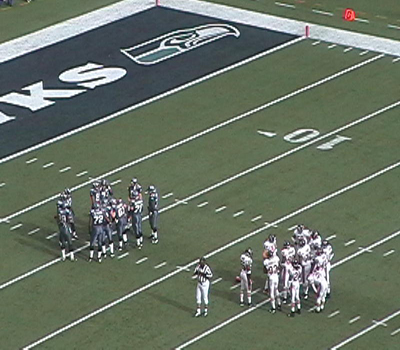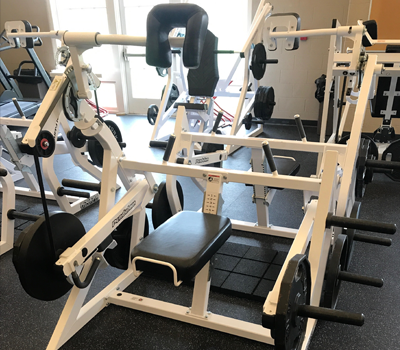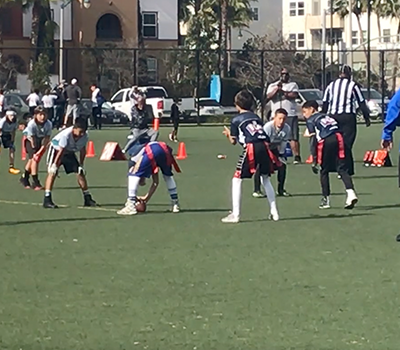NFL Player’s Stories
Over the past three months, one current and four former NFL football players shared their concussions stories.
Terrell Owens
Terrell Owens is a former NFL wide receiver, six-time Pro Bowler and an NFL Hall of Famer. And with playing in the NFL for close to 16 seasons, he says he only sustained two concussions. He is the only player in NFL history to score two or more touchdowns against all 32 NFL teams.
“One hundred fifty-three touchdowns, so I was probably running scared. I avoided a lot of hits,” Owens said.
He says one of those concussions he received was especially bad. It occurred during a play in a game and he said it “happened so fast.” After he got hit, he was disoriented.
“I got hit, and then it was black. I came back, and I ran over to the huddle. I don’t think anyone knew I was gone until I got to the huddle,” Owens said. “Then in the huddle, I heard the play. But at the end of the huddle, I didn’t know what the play was. So then I went to line up, and since I didn’t know what the play was, I was just running around. And that’s when they realized something was going on.”
This game occurred before the concussion protocol became a part of the NFL. He sat out for a little while, put his helmet back on and went back out on the field to play the rest of the game.
During the offseason, he would rest, eat healthily and take care of his body.
Cameron Lynch
Tampa Bay Buccaneers linebacker, Cameron Lynch, may love football, but he isn’t in the NFL just for the love of the game.
He doesn’t want to be defined in life as a football player. His real passion is journalism. He says he is in the NFL for the money and will play for a minimum of five years. But after he completes his four-year tenure, Lynch says he will receive a pension and will be “set for life.”
“Concussion me up. CTE me up. I need that money,” Lynch said.
And once Lynch gets that money, he wants to create his own production company. He wants to make it similar to Uninterrupted and The Player’s Tribune where athletes can feel safe to say what they need to say.
“I want to be able to provide a space for a bunch of athletes and put out sick content,” Lynch said.
But he says he likes to stay active physically, mentally and spiritually to hopefully prevent himself from receiving bad brain health symptoms in the future.
“I do a lot of yoga, meditate, read and play video games. I keep my body centered with self-care. Anything that keeps you young and fun,” Lynch said.
Gregg Guenther
Gregg Guenther, a tight end for the Tennessee Titans and Cincinnati Bengals from 2005-2006, says he is a little worried about receiving CTE in his future after seeing the movie “Concussion” and the information circulating the internet. But he also saw someone firsthand suffer from CTE.
“My cousin’s husband, who actually passed a few years ago actually, suffered from CTE. Watching him deteriorate the last three years before he passed was kind of tough to watch because he played 12 years in the NFL,” Guenther said.
Guenther said his cousin’s husband became a lawyer after his football career. He said he was a well-accomplished and intelligent man.
“I saw him at a USC spring game in 2012 or 13, I believe, and he first asked me about his son. I was like, ‘Oh yeah, I’ve seen Freddy. How’s everything?’ Next sentence was, ‘have you seen Freddy?’ And I kind of looked at him like, ‘Oh S***. Like, it’s that bad.’ So then from that day, he pretty much deteriorated where he couldn’t take care of himself two years later,” Guenther said.
Guenther said the effects of the disease happened quickly. It happened within a five to six-year period. It was hard to see someone who loved karaoke and being a smart lawyer try to hold a conversation or try to take care of himself.
Guenther sustained two concussions, but the one that stands out to him the most is one of the two that he received in college football while playing for the University of Southern California Trojans. He says it’s very interesting to wake up and not remember who you are.
“I hurdled a defender, and as I came down, someone kind of helmet-to-helmet into like the side of my head, like the temple area,” Guenther said. “I blacked out, but I kept playing. No one else knew what was going on. Woke up in the huddle an hour and a half later, completely lost, confused, didn’t know who I was, where I was. Until someone realized, oh you have an issue. But later, I went back and watched the tape of me playing. I was almost on autopilot or no one was home until I kind of came to.”
His recovery process was only a couple days for both concussions. He had a slight ongoing headache and was sensitive to light. He said the symptoms weren’t that bad.
“But after the concussion, I still felt like when you wake up after a long nap and the first five seconds, you’re like, ‘where am I?’ and you’re a little bit hazy,” Guenther said. “It was kind of like that for the first couple of hours.”
Marques Hagans
Marques Hagans, a former wide receiver for four NFL teams in 2006-2010, is not aware of receiving any concussions while playing football. Although he knew the consequences of getting concussions and injuries going into the NFL, he wanted to play because he loved the sport. He said he wasn’t gifted academically, but he was gifted athletically.
“My older cousins went to college for free and two of them played in the NFL and I felt like I was next in line,” Hagans said. “It was a way to get out and save my life and go to school for free and try to provide a better life for my mom, my sister and myself.”
Hagans is now the wide receiver coach for the University of Virginia Cavaliers. He was a Cavalier himself in 2001-2005. He wanted to give back to his former team and other young future NFL players.
“I think there’s an opportunity to develop relationships with young men and develop them and help them become better people and help them find that connection to the game. Besides being a father and a husband, something that I’m naturally good at, as well,” Hagans said. “Understanding the game and communicating it to players and developing relationships and experiences that will last a lifetime. And that’s what I love to do.”
Thomas Williams
Thomas Williams, a former linebacker for six NFL teams in 2008-2012, says he is uncertain about how many concussions he received while playing football, but he “got a lot.” He also says most people who have played football from high school to the professionals will get CTE. But it is the football player’s responsibility to live a healthy lifestyle after their football career.
“I think everybody who has a healthy lifestyle, who are constantly are trying to grow and expand their brain and their knowledge aren’t just kind of sitting around after they’re done playing,” Williams said. “Those are the guys who I’ve seen who have a great success of living a healthy life and don’t have the same type of implications or problems than people who just sit around and aren’t doing anything. Like the people who are reading, people who are outgoing, people who are out and about doing activities outside, being around people who can teach them and be in good environments.”




